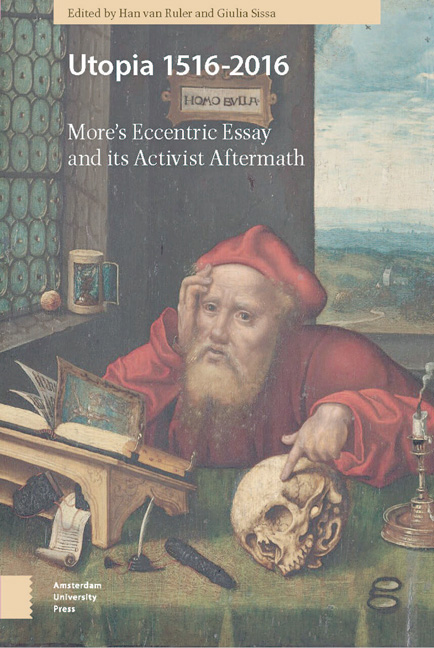Book contents
- Frontmatter
- Contents
- Introduction
- PART 1 THE BOOK
- A Praise of Pain: Thomas More’s Anti-utopianism
- Bodies, morals, and religion: Utopia and the Erasmian idea of Human Progress
- PART 2 ORIGINAL RECEPTION
- Realism Vs Utopianism: The Problem of the Prince in the Early-Modern Netherlands
- From Thomas More to Thomas Smith: Utopian and Anti-Utopian Understandings of Economic Change in Sixteenth-century England
- PART 3 PHILOSOPHICAL CRITICISM
- Reflections on the Utopian Mind
- Utopianism in Today’s Health Care
- PART 4 PHILOSOPHICAL ACCLAIM
- Utopianism and its Discontents: A Conceptual History
- The integrity of Exacerbated Ambiguity: More’s Utopia as an Evaluative Thought Experiment
- Index
Reflections on the Utopian Mind
Published online by Cambridge University Press: 12 December 2020
- Frontmatter
- Contents
- Introduction
- PART 1 THE BOOK
- A Praise of Pain: Thomas More’s Anti-utopianism
- Bodies, morals, and religion: Utopia and the Erasmian idea of Human Progress
- PART 2 ORIGINAL RECEPTION
- Realism Vs Utopianism: The Problem of the Prince in the Early-Modern Netherlands
- From Thomas More to Thomas Smith: Utopian and Anti-Utopian Understandings of Economic Change in Sixteenth-century England
- PART 3 PHILOSOPHICAL CRITICISM
- Reflections on the Utopian Mind
- Utopianism in Today’s Health Care
- PART 4 PHILOSOPHICAL ACCLAIM
- Utopianism and its Discontents: A Conceptual History
- The integrity of Exacerbated Ambiguity: More’s Utopia as an Evaluative Thought Experiment
- Index
Summary
Abstract
Utopianism aims at a global transformation in virtue of which both the external world and our own reality will develop in such ways as to be in greater harmony with our wishes. What utopianism does not take into account, however, is the existence of two important kinds of desire. In the first place, human beings have the need to react symbolically to what cannot be changed. In the second place, they also have a desire for recognition and for a significant life. With these desires, human beings have aims that go beyond morality's protective ideals. Offering the example of transhumanism as a paradigm case of utopianism in our own days, the present article illustrates how utopianism ignores the fact that human beings indirectly desire that certain of their objects of desire remain beyond their control.
Keywords: Non-utilitarian desires, symbolic restoration, morality, social recognition, Transhumanism
Introduction
Utopian thinkers dream of radically transforming reality and of adapting it in an optimal or maximal way to human needs and desires. In their hope to remove the impediments that hinder the realization of their ambitious project as much as possible, they focus not only on transforming the external world, but also on changing some aspects of human existence that may turn out to be recalcitrant to their utopian plans.
It is an assumption of utopianism that happiness will be increased to the extent that human beings are less hindered in realizing their desires. This assumption will strike many people as a truism, but is nevertheless false. It is of course true that human beings hope to remove as much as possible the impediments that prevent them from doing what they want to do. It is, however, equally true that this is not the whole story and that they also have the need to perform actions that have no consequences, as well as paradoxically to maintain the recalcitrant forces that prevent them from reaching their goals.
These are the two sorts of desire that do not fit into any utopian plan to transform reality. The first is probably best exemplified by the human need to honor the dead and to do something for people who no longer exist.
- Type
- Chapter
- Information
- Utopia 1516-2016More's Eccentric Essay and its Activist Aftermath, pp. 171 - 184Publisher: Amsterdam University PressPrint publication year: 2017

